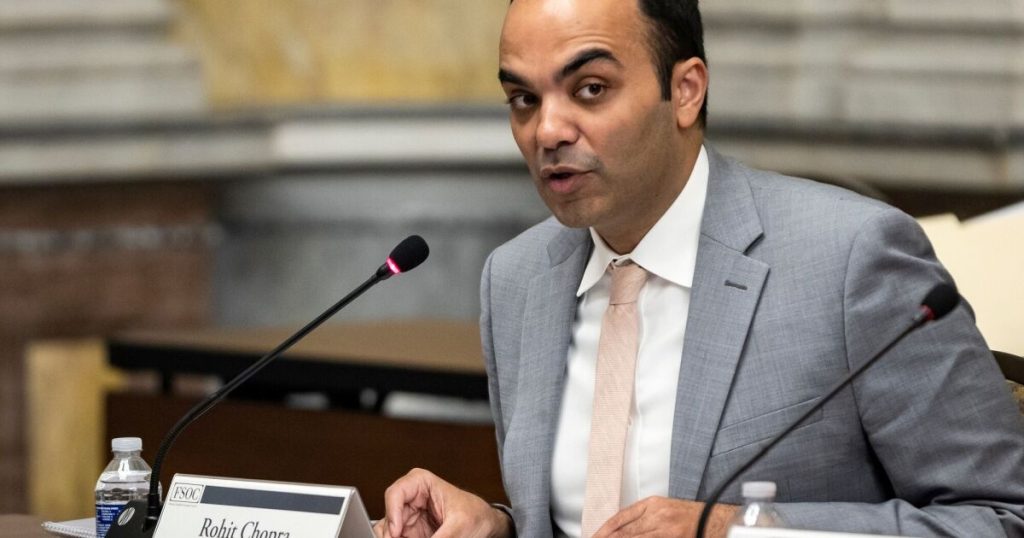Samuel Corum/Bloomberg
TD Bank Group’s historic money-laundering-related crimes this fall have stirred up conversations among regulators, politicians and industry experts about how and when banks should be shut down for such compliance violations.
Consumer Financial Protection Bureau Director Rohit Chopra took the latest whack at the issue Tuesday, proposing that the Federal Deposit Insurance Corp. initiate deposit-insurance termination hearings for banks convicted of charges related to moving dirty money, which would have included TD Bank.
“When an insured bank is criminally convicted, that’s not only a breach of law, it’s also an abrogation of public trust that is fundamental to banking,” Chopra said at the FDIC’s board meeting. “And when it involves money laundering, we have a clear directive to consider whether a bank should maintain its status as an insured institution.”
In 1992, Congress passed the Annunzio-Wylie Anti-Money Laundering Act, giving regulators the power to impose harsher penalties for specific charges, like deposit-insurance termination and charter revocation, colloquially
Chopra, whose role at the CFPB gives him a seat on the FDIC’s board, said the agency has seen too many cases of plea agreements between banks and law enforcement that have been able to sidestep the violations that trigger bank-killing actions.
In October, TD
Specifically, the Canadian institution’s U.S. holding company pleaded guilty to causing the bank to fumble its risk controls, and the banking subsidiary’s crimes include conspiracy to maintain an adequate anti-money-laundering program, conspiracy to fail to report activity and conspiracy to launder money.
Key to Chopra’s point, none of the charges landed TD in danger of charter revocation or deposit-insurance termination hearings, since neither charges against a bank holding company nor conspiracy of money-laundering crimes trigger the harshest punishments.
Chopra said they should, and could, under a different statutory authority.
“The directive to regulators from Congress was clear: impose the most severe penalties available on banks criminally convicted of facilitating the drug trade, human-trafficking rings, dictatorships and terrorist networks,” said a discussion draft submitted by Chopra for the board meeting.
The Office of the Comptroller of the Currency and the FDIC don’t take measures to quash banks’ operations because of the fear that those proceedings would destabilize the industry or the broader economy, said Daniel Stipano, who left the OCC in 2016 after working for 30 years on anti-money-laundering rulemaking and enforcement.
A few weeks after TD pleaded guilty to the money-laundering-related charges, Sen. Elizabeth Warren, D-Mass.,
Warren wrote in a letter to the agency that “absurd legal gymnastics by the DOJ” let the bank skirt full responsibility.
It would be “very significant” and “very disruptive” for the FDIC to launch deposit-insurance termination proceedings for banks that do plead guilty to charges that aren’t specifically enumerated in the 1992 AML law, said Stipano, a partner in the financial institutions practice at Davis Polk & Wardwell. He added that such a change could also make it more difficult to settle a criminal case related to money laundering.
Even if an FDIC hearing didn’t lead to deposit-insurance termination, Stipano said, it would probably be the end of the bank.
“You’d have this uncertainty hanging over the head of the bank while this process is playing out, which would send a terrible message to the financial markets and the public at large about the institution,” he said. “You probably would create a run.”
Sarah Beth Felix, an AML consultant and founder of Palmera Consulting, said Chopra’s comments serve as a good reminder, and threat, to banks about the importance of risk management. She added, though, that she was disappointed he didn’t mention another part of the Annunzio-Wylie act — criminal charges for board members.
“If you’re going to go retro and quote a 32-year-old law, don’t forget the rest of it,” Felix said.
Chopra’s comments were limited to the FDIC, which can’t bring criminal charges against individuals as a civil agency. Felix said it felt like his comments didn’t capture the “full spirit” of Annunzio-Wylie.
Warren, in her October letter, pressed the DOJ about not holding TD executives accountable for the bank’s crimes. The Justice Department has
Going forward
Stipano said although a shift in regulation could affect anti-money-laundering regulations and requirements, he doesn’t think regulatory action will be thrown to the wayside.
“If you look at it over time, enforcement of the anti-money-laundering laws tends to not really be much of a partisan issue,” Stipano said. “I’m not expecting any kind of a dramatic shift in the enforcement policies of the agencies with the change in administration.”
Felix said she’s concerned that some of the focus on AML will be “lost in the name of efficiency,” especially in light of the Department of Government Efficiency, an advisory committee headed by Elon Musk and Vivek Ramaswamy that will operate outside of the government. (Musk has
“I don’t see anyone in there with an even view of the good that banks do when they do have a sound AML program, and the bad that banks facilitate when they’re like TD,” Felix said. “I don’t see the new administration picking this ball up and going, ‘Yeah, let’s make sure these banks are doing what they’re supposed to be doing.'”

